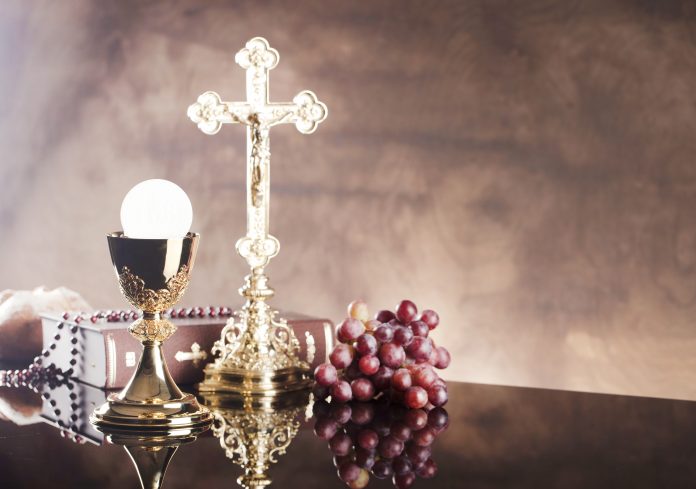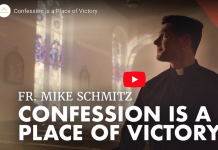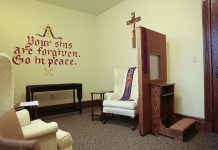
by Mickie Abatemarco
A young couple I know, with a three-month-old daughter, recently came to see me.
The parents decided before their child’s birth that they wanted to bring her up in the faith. Carrie had a strong Catholic upbringing and attended Catholic schools. After college, she continued to be a person of faith, but was not actively involved in the Church. Jim was baptized and received his First Communion, but his catechesis ended there.
Once the couple made the decision to bring up their child in the Catholic faith, they began to attend Mass at different parishes and decided on the one that would become their parish. They knew that they probably would be moving in a year or two, but wanted to connect with a Catholic community for now. This is one of those “moments of return” when we can welcome a family with open doors and help it realize that it is the domestic church.
The Domestic Church
Today’s families are mobile, they no longer have roots in one parish. Therefore, it is important to help them understand that just as the larger Church is a communion of persons, so the family is a small communion of persons. As Pope John Paul II started in his apostolic exhortation “On the Family” “The Christian family constitutes a specific revelation and realization of ecclesial communion, and for this reason…it can and should be called the domestic church” (n. 82, Washington, DC: United States Conference of Catholic Bishops, 1982).
It does not matter how mobile the family is, the Church will always be present. The challenge comes in how we as catechist help the families understand that the larger Church is there to support them and journey with them, but the church that they create in their homes will help them better understand the call of the Gospels and the grace of the Sacraments.
This brings us back to the importance of adult formation. In the United States bishops’ Pastoral Plan for Adult Faith Formation, “Our Hearts Were Burning Within Us,” the bishops state: “The scope of catechetical content is cognitive, experiential, and behavioral, and it requires development in ‘the threefold dimension of word, memory, and witness… It takes place through formation in doctrine and the experience of Christian living, both together foster each disciple’s growth into the full faith and life of the Gospel. This approach also promotes a natural link between the faith we profess and celebrate and the life we live, thus meeting one of the principal challenges of our day (“Our Hearts Were Burning Within Us” sec.97).
The Sacraments and the Domestic Church
Our role is to open that window for the parents whose children are preparing for a sacramental moment in their lives. Each Sacrament has a value that connects the family, the “domestic church,” to the faith we profess and the life we live.
Baptism: We begin with the value of belonging. Each person is called to be priest, prophet, and king. When parents come for baptismal prep, our role is to help them connect this call to their everyday lives. Baptism gives us a share in the common priesthood of all believers; it challenges us to the prophetic ministry of being witnesses to the gospel and, through our kingship, to be partners with God in the transformation of the world.
Explore with parents the responsibility to give witness to this call. They have an opportunity to share this with the child they present for Baptism. We are called to present the events of our day as an offering to God. That includes the messiness and the difficulties as well as the triumphs. This moment allows us to be church and to be connected in our call with all believers.
Confirmation: We are challenged to accept the value of commitment. It is a sacramental moment to confirm the “yes” to God’s call that our parents said “yes” to at our Baptism. The Catechism of the Catholic Church (CCC) describes Confirmation as a deepening of baptismal gifts. It says that the Sacrament roots us more deeply in our identity as God’s children, uniting us more firmly with Christ, increasing in us the gifts of the Holy Spirit, binding us more closely to the Church, and giving us special strength to bear witness to our faith (see n. 1303).
Explore with families what each member’s identity is as a child of God. Encourage them to choose one Gift of the Holy Spirit that they feel called to live. Together they will create a stronger family of faith that will give them the strength to go out and bear witness to the Church community.
Eucharist: We are offered the value of sacrifice in its greatest form and we are offered the opportunity for transformation. Pope Benedict says: “The Eucharist brings about a fundamental transformation. God no longer simply stands before us as totally other. He enters into us and then seeks to spread outward to others until He fills the world, so that His love can truly become the dominant measure of the world” (World Youth Day, Cologne, 2005).
As catechists, we often see our role as the one who prepares children to “receive” the Eucharist. In reality, our role is to explore with families what it means to have Christ enter into us and how they can live this transformation in their homes, in their lives at work and play.
Reconciliation: We are humbled by the value of forgiveness and the opportunity for conversion. In his first encyclical, Redemptor Hominis (Redeemer of Man), Pope John Paul II described the gift of the
Sacrament of Penance:
In faithfully observing the centuries-old practice of the Sacrament of Penance—the
practice of individual confession with a personal act of sorrow and the intention to
amend and make satisfaction—the Church is therefore defending the human soul’s
individual right… to a more personal encounter with the crucified forgiving Christ,
with Christ saying through the minister of the Sacrament of Reconciliation: “Your sins
are forgiven” (Mark 2:5); “Go, and do not sin again” (John 8:11).
As is evident, this is also a right on Christ’s part with regard to every human being redeemed by him: his right to meet each one of us in that key moment in the soul’s life constituted by the moment of conversion and forgiveness. God is not out to catch us in our sin, but is there to hang on to us in spite of our sin.
Families understand this. It is part of their lives and their stories. We are challenged to connect this familial experience to the sacramental experience. We can do this through sharing scriptural stories of family life. Like the story of the prodigal son, reconciliation is a journey from conversion to reconciliation to celebration.
We can help families understand that conversion is a process that begins with the realization that all is not right with our values and style of life, but with the grace of the Sacrament we can be open to forgiveness and conversion.
Anointing of the Sick: We are blessed with the value of healing. When those who are sick are anointed, they should be “assisted by their pastor and the whole ecclesial community, which is invited to surround the sick in a special way through their prayers and fraternal attention” (CCC, n. 1516). All families are faced with sickness and death. As Baptism is a “moment of return,” so is the Sacrament of the Anointing of the Sick.
For many families, there is fear and misunderstanding about this Sacrament. The Sacrament is one of healing—not always physical healing, but healing of heart and spirit. Our role is to communicate the importance of this Sacrament for everyone who is in relationship with the one who is ill. As they journey together, the strength of Christ will be present to the family. They are church, and God will not desert them.
Marriage: We are gifted with the value of covenant. Marriage is a covenant “by which a man and woman establish between themselves a partnership for the whole of life” (CCC, n. 1601). The Second Vatican Council reminds us that the marriage covenant exists not only for the good of the partners and their children but also for the good of the Church and the good of society at large (see Church in the Modern World, n. 48). If this is understood, the opportunity arises for the beginning of a domestic church that will grow and change in relationship to the growth and challenges of the family, with God at the center.
We can support this covenant by offering opportunities for families to experience the presence of God and the gifts of the parish community that is there to support them, worship with them, and pray for them.
Holy Orders: We are offered the value of service. Holy Orders, like marriage, consecrates some members of the church into a way of life through which they live out their baptismal commitments. While married couples live their faith in the domestic church and provide the wider Church with new members, those called to Holy Orders build up the Church by serving the whole faith community. The priest becomes the sacramental center from which the community hears the Good News, receives the Sacraments of God’s love, receives forgiveness for sins, and unifies the community as one Body of Christ.
We can help those we catechecize better understand the role and ministry of the ordained by inviting the priest and deacons in our parishes to share in the catechetical moments and lives of these families.
We Become One Body
We need to honor each domestic church as it moves from place to place and changes in family size and structure. No two are the same, yet each brings its gifts to the whole faith community and, together, through the Sacraments, we become one Body of Christ.
Mickie Abatemarco is Director of Faith Formation and Social Justice at St. Catherine of Siena Church, Riverside, Ct. She serves as Vice President of NPCD and the New England Representative.
Copyright 2010, Bayard, Inc. All rights reserved. This article is protected by United States copyright and other intellectual property laws and may not be reproduced, rewritten, distributed, redisseminated, transmitted, displayed, published or broadcast, directly or indirectly, in any medium without the prior written permission of Bayard, Inc.
This article was written by the Catechist Staff and appeared in Catechist magazine, December 2010.
Image Credit: Zolnierek/Shutter Stock 592148795




